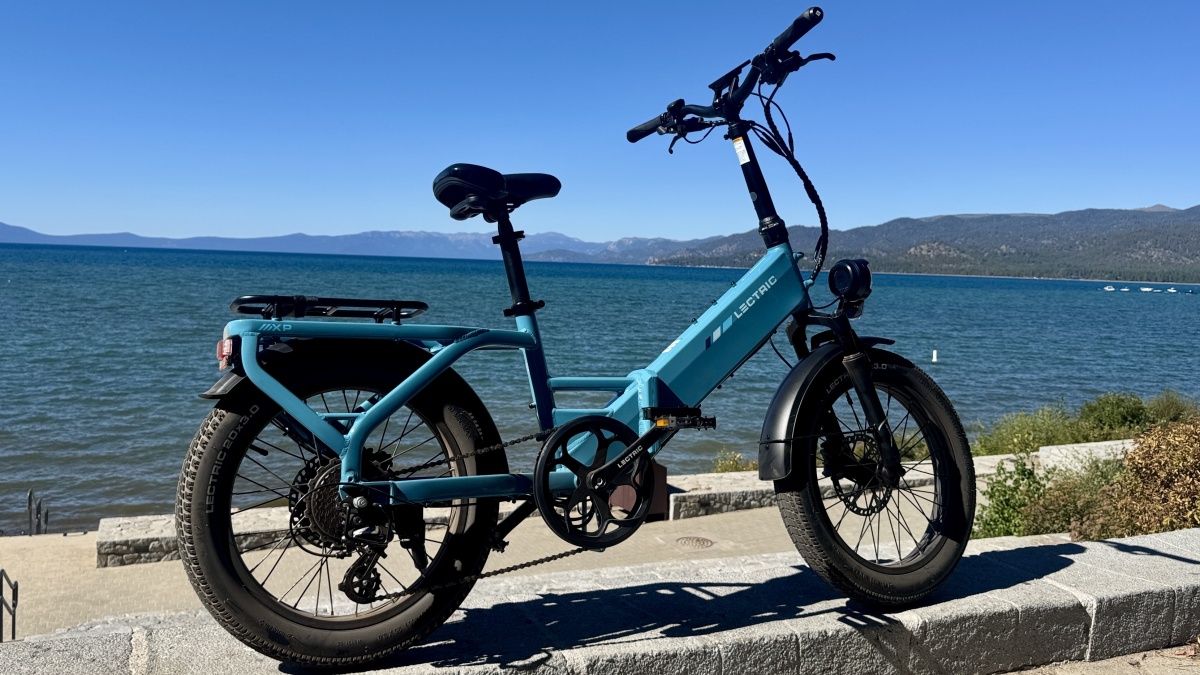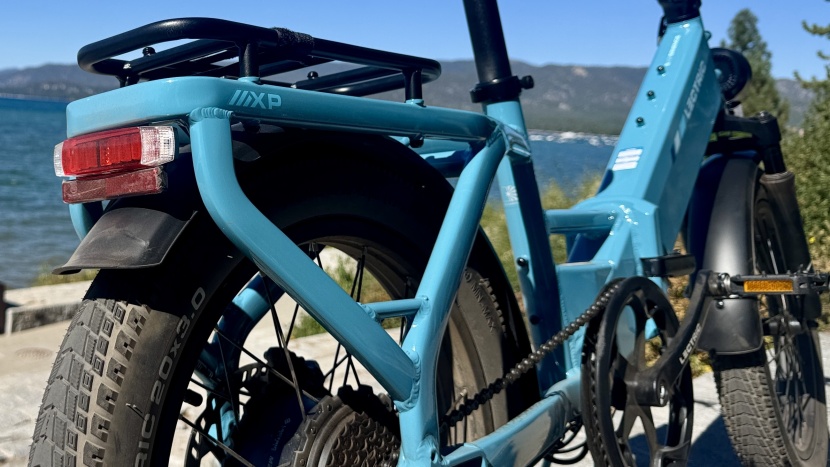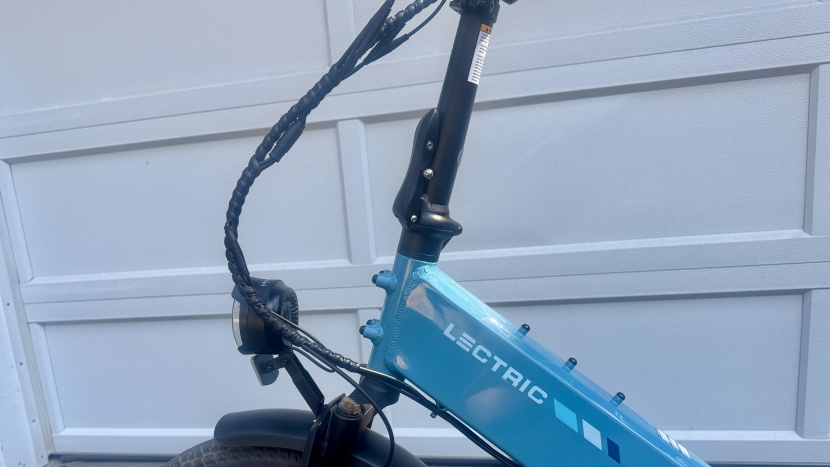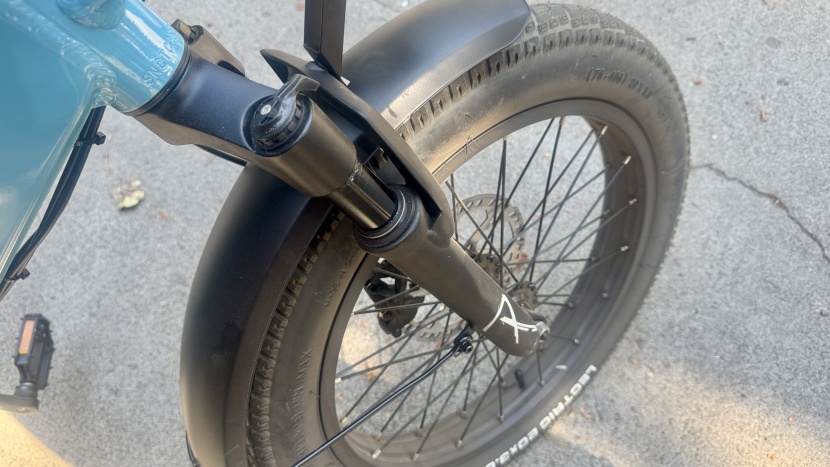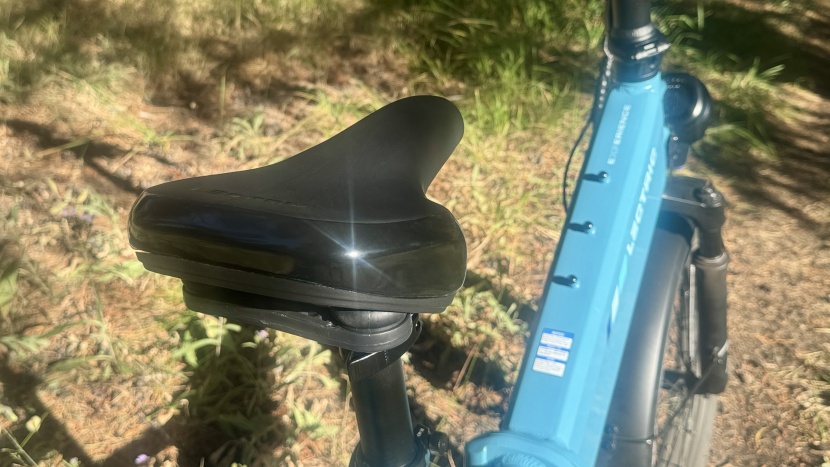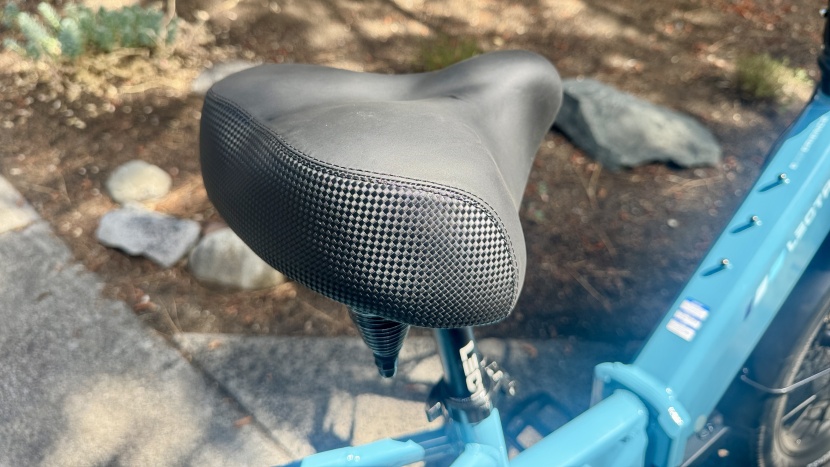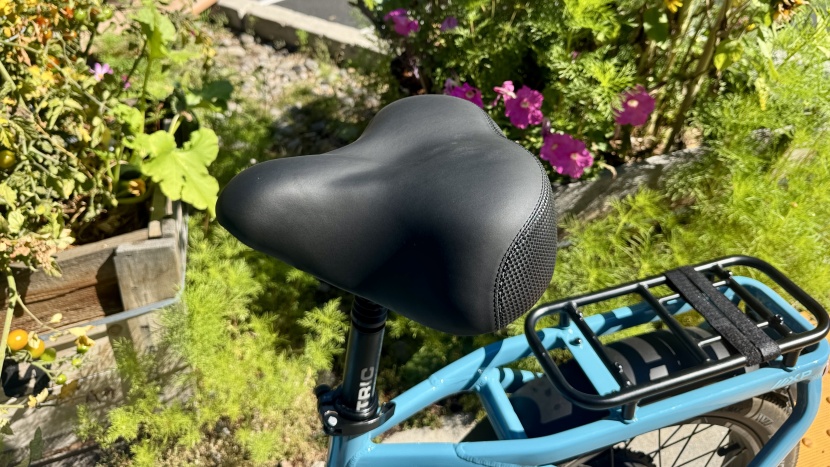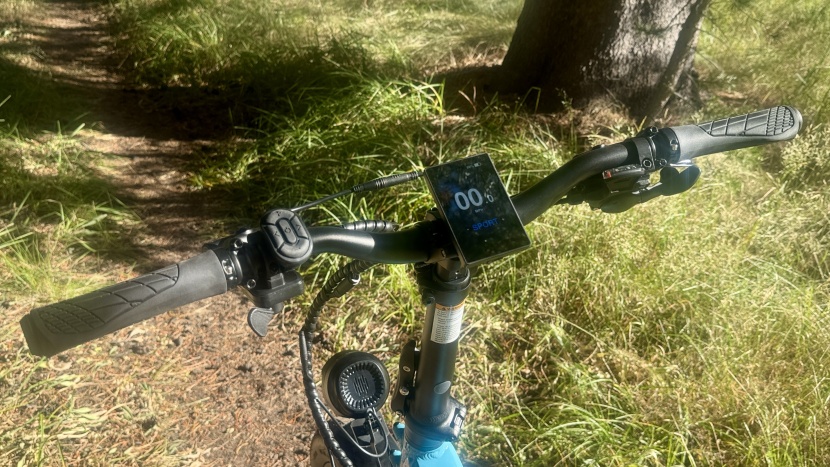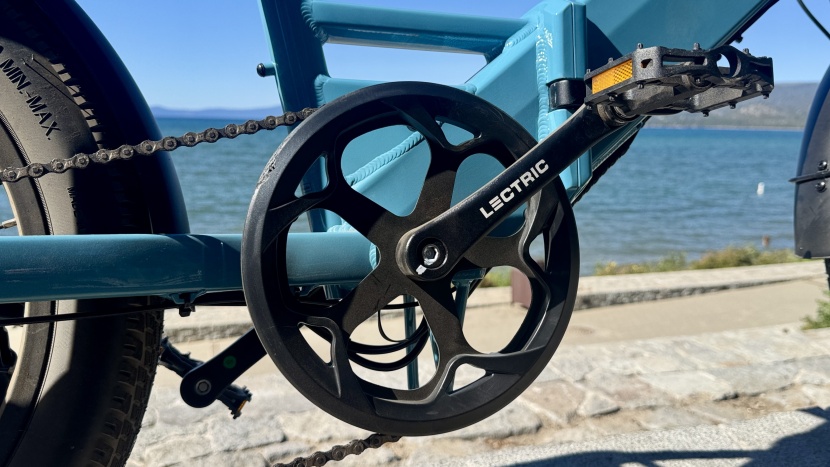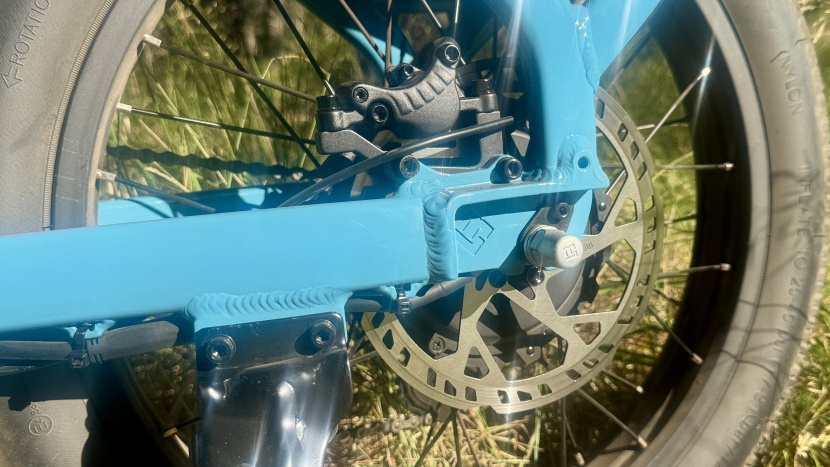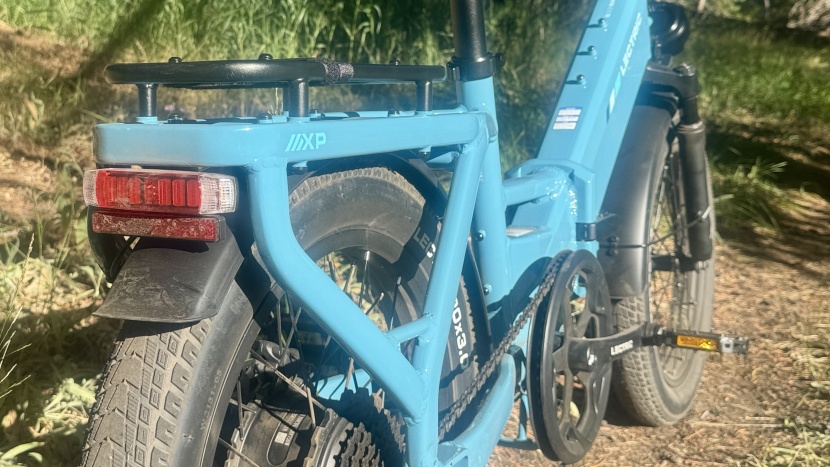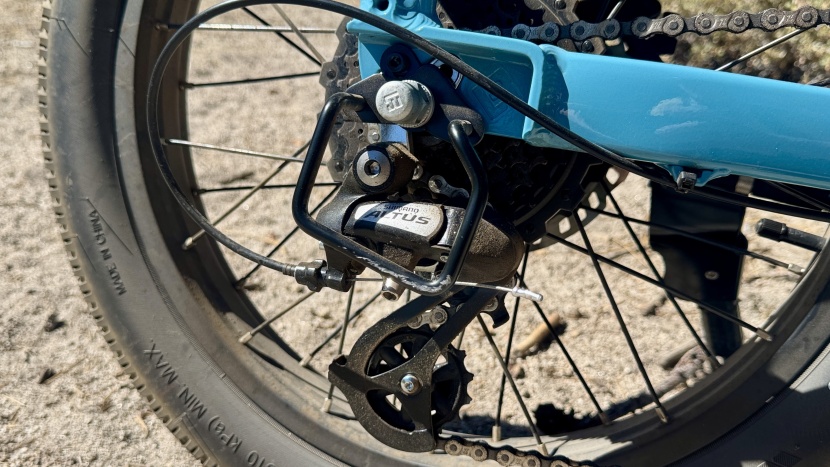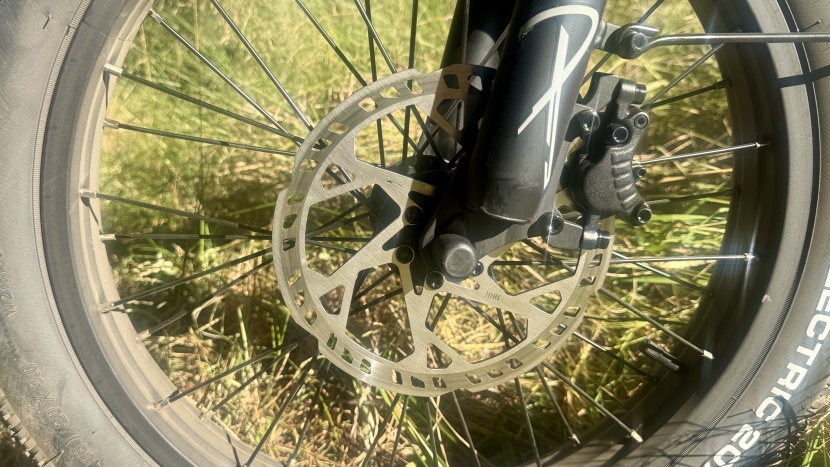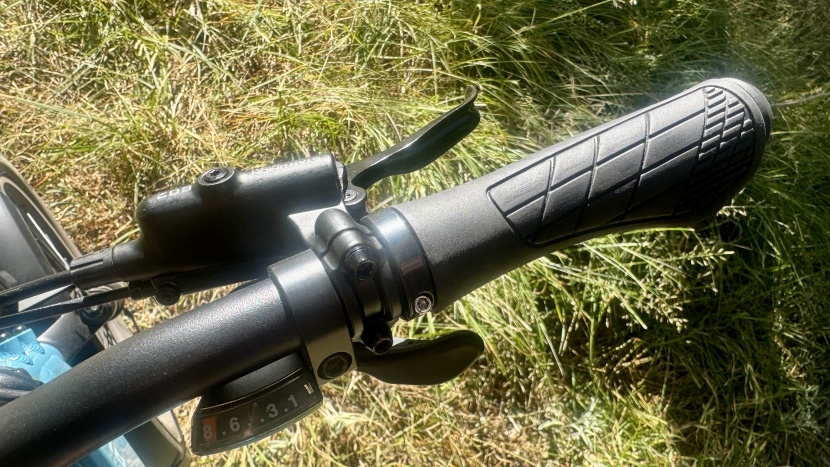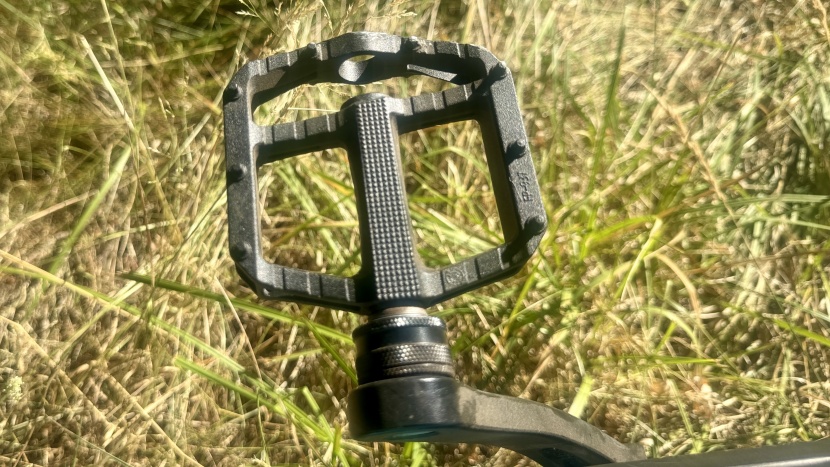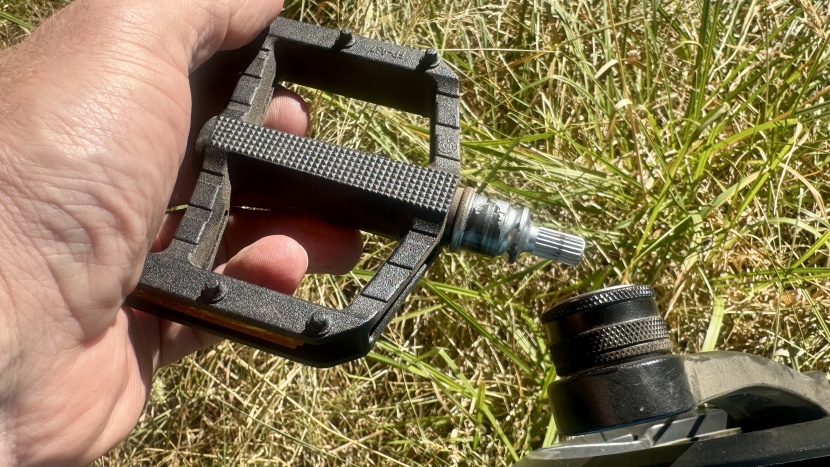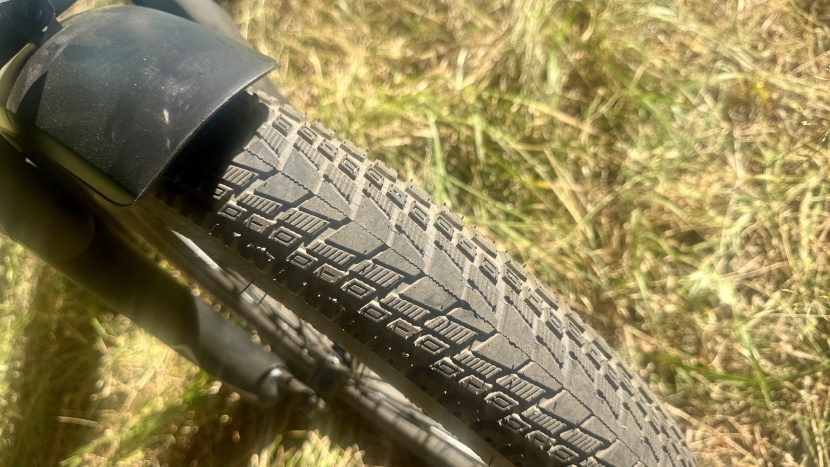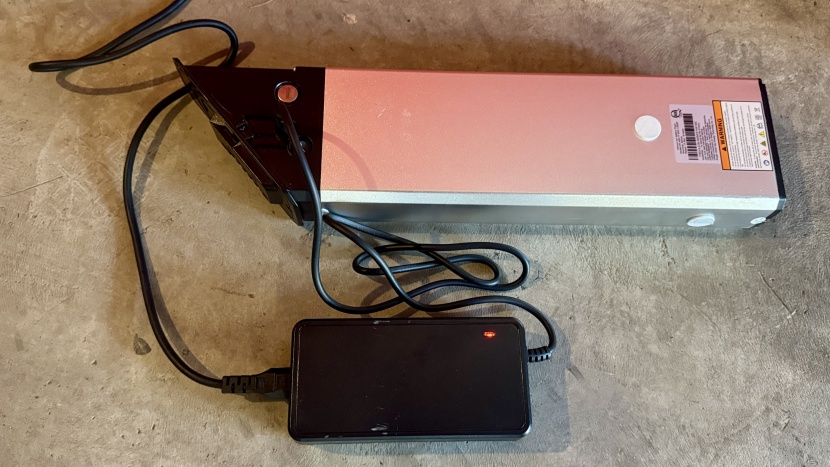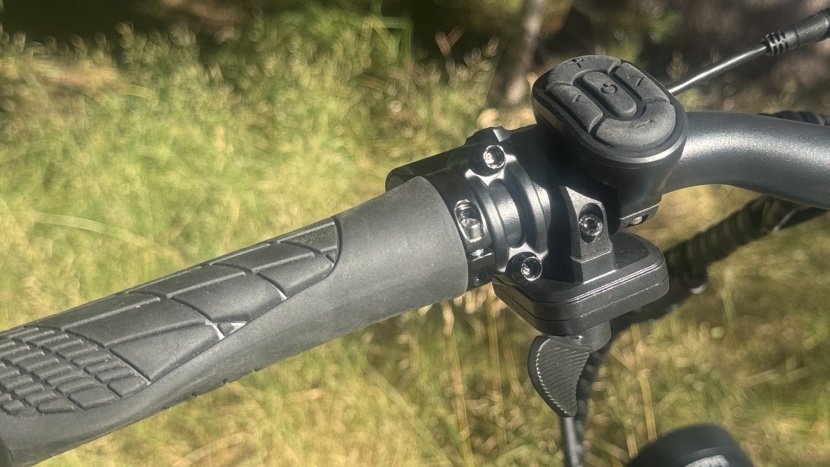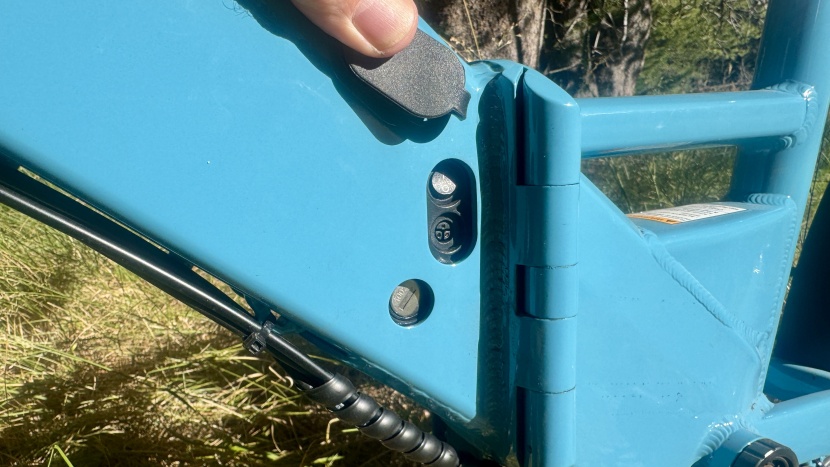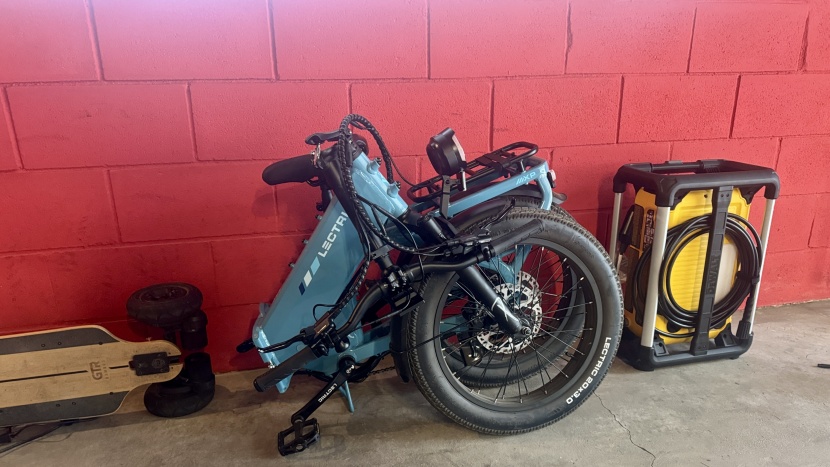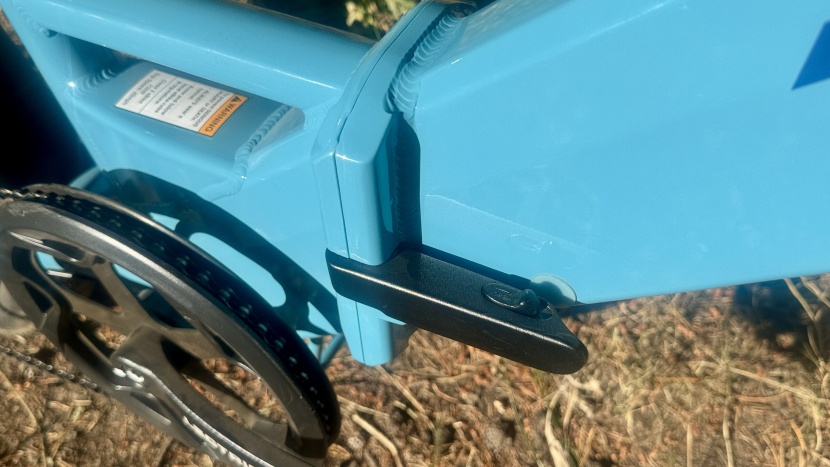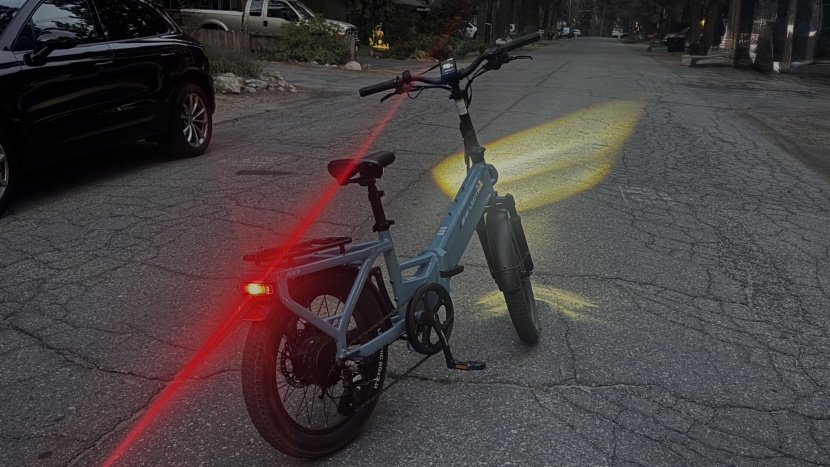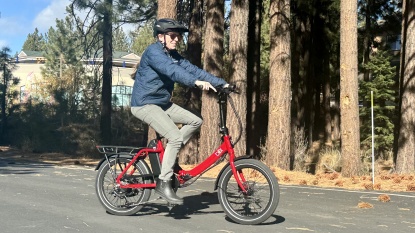
Our Verdict
Our Analysis and Test Results
The Lectric XP 3.0 was the third-best-selling electric vehicle in the United States last year, behind two Tesla models. Lectric's combination of innovation, value, and customer service seems to pay off for them. We recommended the bike to people from all walks of life, many of whom planned to spend significantly more, or who didn't feel the need to have a folding bike. The XP4 builds on the success of the XP 3.0 and addresses many of our criticisms of the previous model. The XP4 is available in Step-through (tested here) and Step-over designs with two different-sized batteries and motors. 20-inch wheels use new 3" hybrid tires and a suspension fork to buffer the ride, while a new zero-degree stem tightens up the cockpit reach. It's affordable, arrives assembled, and boasts features that outdo the competition.
Ride
The Lectric XP4 is a folding bike, but that doesn't mean it rides like one. While there is no escaping the ride quality of the smaller wheels, there's nothing about the ride dynamics that would clue you into the fact that this bike folds up for easy storage or can quickly stow into the trunk of your car. The previous XP felt like a big bike with a long reach, which made it harder for smaller riders to handle. This bike uses a zero-degree stem instead of the 12-degree stem on the past model, shortening the reach by 2 to 3.5", depending on your saddle height. This allows riders to sit a bit more upright and feel less stretched out in the cockpit. Lectric still offers the same sizing guidance as the old bike, but our most petite testers (5'0' and 5'1") are more comfortable on the XP4 than they were on the XP 3.0.
The new bike adds a torque sensor, a brilliant new full-color display, and the option for a more powerful motor and larger battery. Rolling on custom-designed, low-noise, 3-inch wide tires, Lectric makes the most of compact 20" wheels. To keep you rolling, Lectric uses puncture-resistant tires and slime-filled tubes that should make flat tires a thing of the past.
A lockable suspension fork smooths out imperfections in the road, and an optional suspension seatpost adds comfort to the rear end. The 71-degree headtube angle provides the bike with a sporty, agile steering dynamic that is most comfortable at speeds under 25mph.
The 45.5" wheel base gives the bike a compact, yet comfortable feel that has no problem dicing up the urban environment or cruising along the bike path. Faster speeds, such as those found on steep downhills, make the bike feel a bit nervous, but the Star Union 602 hydraulic brakes and 180mm rotors effectively bring the bike to a stop. We ordered this bike on its first day of availability, and it came with a bevy of upgrades and accessories. One of those upgrades was the comfort saddle and suspension post that proved just a bit too comfortable for most of our testers. After just two rides, we swapped the saddle and post to the standard versions that we found more to our liking.
The step-through and step-over frames are fundamentally different in design, with the bottom bracket hanging below the main tube on the step-over version and centered in the down tube on the step-through version. That said, their geometry is the same, and we're fond of bikes with a lower step-through height; ours measured 19.5". Both bikes get a new style of “Level-UP” rack, capable of holding 150 pounds and compatible with a wide range of Lectric accessories, including a Yepp child seat. There are a few things that remain unchanged from the previous model, including a weight limit of 330 pounds and a suggested user height range of 4'10" to 6'3". The standard telescoping seatpost has 19.5" of adjustability, while the handlebar height can be adjusted by 3.5". At 5'10", I spent the most time on this bike and found the fit to be near ideal for urban riding.
The XP4 isn't a bare-bones offering; it arrives with useful items like quiet, lightweight polypropylene fenders, lights that include working turn signals, and a brake light. Lectric's new quick-release pedal is an improvement over previous folding models, but for those aiming for serious mileage, swapping to standard pedals with less play might be a better option.
Range
Lectric offers the XP4 in two configurations: one with a 500-watt motor and a 500Wh battery, and the other with a 750-watt motor and 840Wh of power from its 17.5Ah battery. Both bikes use a 48V system, while the standard bike uses a 20 amp controller, and our test bike has a larger 24 amp controller. This gives the XP4 750 considerably more power but also takes a larger toll on the battery.
When we took the XP4 out for range testing, we noticed the battery's state of charge stayed at 100% for an exceptionally long time. That is because the readout moves in 10% increments, ie, 100, 90, 80, etc. As the numbers notched down, we were impressed by the amount of ground we had covered. When the battery finally showed no remaining charge, the odometer showed 37.2 miles, and our tracking apps indicated over 2000 feet of climbing.
Keep in mind that these tests are performed with only the throttle, so even a small amount of pedaling should net you a higher range. Lectric claims that the bike has a range of “up to 85 miles,” and that's likely pretty accurate if you're adding some leg power on relatively flat terrain. This is a larger range than any other folding electric bike we've tested. The bike comes with a 2-amp charger that can charge the battery in 9 hours, but it's also compatible with a 5-amp fast charger that completes the task in just 3.5 hours.
Power
The XP4 750 we opted for is a powerful little bike, generating 1263 watts on the dynamometer. We measured the peak torque at 45Nm, which isn't surprising given our experience riding the bike for a few weeks. This is more power and torque than any other folding bike we've tested, and even more than the bulk of all electric bikes we've tested. In the hill test, the XP4 sped up to 19.1 mph and slowed to just 17 mph on the steepest section of the grade. Accelerating to 20mph with the throttle took just 7.5 seconds.
The XP4 has five levels of pedal assistance that add to your pedaling efforts. New for this model is a torque sensor that gauges the power of your input and adds proportionally more power. Separate from ride modes are the four different e-bike classes you can put the bike in. Class 1 allows you to ride with only pedal assistance up to 20 mph, Class 2 adds the functionality of the throttle, and Class 3 raises that top pedal-assisted speed to 28mph. The bike also has a California Class 3 that allows for 28 mph pedal-assist speeds but disengages the throttle. They've moved away from the twist throttle and instead use a small lever throttle that sits just below the left grip.
The 750 is a very powerful bike, and while you can adjust the throttle to correspond to your PAS levels, using the throttle in Turbo mode is strong enough to be uncomfortable. The acceleration in the top two levels of pedal assist feels jumpy and can catch you off guard if you're not holding on tight. The pedal assist feels adequate in the lower-powered settings, but also feels quite strong for our 180-pound main tester. This is a bike I wouldn't recommend for those new to ebikes or lighter-weight riders. With that said, if you're heavier or plan to use the bike to haul a passenger or heavy gear, you'll find plenty of torque to assist you.
Interface
The XP4 uses a 3.5" TFT display mounted in the center of the handlebars. The layout of the data and the color contrast are much improved from past models and are amongst the best in the ebike market at any price. Interacting with the bike is done through a 5-button controller on the left side of the handlebars. The remote feels intuitive and easy to use, but if you're wearing gloves, the small buttons can be hard to press accurately.
Unlike past models, you won't need a magic decoder ring to figure out how to change the settings. All of the options for the bike's setup are in clear verbiage, and scrolling through and selecting options is as easy as using a modern smartphone, although the display does not have a touchscreen. Our only complaint about the display is the coarse gauge for the battery's state of charge; 25% and 15% will both show up as 20% and there may be a difference in the amount of power you use when the remaining juice is dwindling.
The 840Wh battery nestles into the front half of the downtube and can be removed by folding the bike in half. Unlike past Lectric models, you can ride the bike without the key inserted in the battery, something we felt was a security concern on the previous model. The battery now features an on/off switch next to the charge port, and both are covered by a rubber door to prevent water and debris from intrusion. The battery can be charged off the bike, but it's not exactly easy to extract it from the frame. The battery weighs just over 8 pounds, while the bike with the battery installed weighed in at 71 pounds, 9 ounces.
Assembly
As a mail-order, direct-to-consumer brand, Lectirc makes the assembly pretty straightforward, and the XP4 is no exception. The majority of your time is spent removing packaging material and making fit adjustments. Since the bike folds in half, Lectric can use a smaller-than-normal bike box, which saves on shipping costs, but that isn't a big concern, as their bikes ship for free in the continental US.
From opening the box to the bike being ready to ride took about 15 minutes, with nothing complex. Most people who can follow a few instructions should be able to assemble the bike safely in a short amount of time. Of course, you can always utilize your local bike shop if the task seems daunting or you're not mechanically inclined.
Once we had the bike assembled, it sounded like something was wrong. We found several loud rattles coming from the bike, which we found disconcerting and wanted to address before embarking on longer rides. The main source of the rattles was from the downtube-mounted battery, and we were able to alleviate those noises by using sticky foam tape on a few surfaces of the battery. Another source of rattles was the latch that holds the frame together; it wasn't going to come undone, as there is a safety switch, but the latch components rattled when tight. An email to Lectric customer service was met with a prompt response on how to adjust the latch, and within minutes, we had that issue solved. Still, another rattle sounded troubling, and we were able to identify it as the controller that sits in the bottom cavity of the downtube. The controller isn't bolted to anything and just floats loosely in this space, so we trimmed a piece of pool noodle and inserted it just in front of the bottom bracket; all rattles were solved.
Value
The real value is probably in the XP4 500 at under $1000, but those wanting additional power and range get a lot of bike for the dollar with the XP4 750. Lectric usually has a sale going on where they include several accessories with the bike, and that sweetens the deal. Our test bike came with the large comfort saddle, suspension seatpost, elite headlight, level-up rack, and a bike lock. You'll be hard-pressed to find a better deal on a reputable folding bike, especially one with this much power and range.
Conclusion
If it's value that you're after, Lectric has your number. While we found the bikes' rattles troubling, they were all fixed for less than a dollar and some sleuthing. This bike is a phenomenal value, and given its exceptional range, it can replace a large number of car trips in the right areas and climates. Since you don't need a bike rack to transport the XP4, you won't have to spend money on one, and the bike takes up less room in storage than most. If you're new to ebikes or don't plan to carry heavy loads, consider the XP4 500 as it's better suited for casual use. While this bike scored higher in most of our metrics, its weight compromises its convenience and makes it harder to fold, transport, and move around.


